Dog owners never have to worry about eating alone—there’s always a furry someone waiting patiently for a bite.
While it’s hard to resist those puppy eyes, many owners wonder whether certain human foods are okay for their best friend to eat.
And what happens when a pet eats something they shouldn’t? Does pet insurance cover unexpected illnesses from dietary mishaps?
To get to the bottom of dog nutrition questions and trends, we surveyed over 1,000 dog owners about their dogs’ diets and crunched Google search data. We also consulted Lemonade’s favorite vet, Dr. Stephanie Liff, for her expert advice on dog nutrition.
- The carnivore diet is the most popular specialty dog diet (41%), followed by grain-free (14%) and organic (6%) diets. Only 27% of owners don’t feed their dogs a specialty human grade diet.
- Owners who feed their dogs a vegan diet spend the most on dog food for an average of $4,274 annually on dog food costs, while those who stick to a conventional diet spend just $692.
- Owners who feed their pups an organic diet spend the most amount of time per week preparing their furry friend’s meals—which includes 18 minutes on vegetable preparation, 18 minutes on alternative food research, 16 minutes on organic food shopping, 16 minutes on food product research, 16 minutes on dog diet research, and 14 minutes on meat preparation.
- Miami, Atlanta, and Las Vegas are the cities where pet owners are most curious about dog-friendly human foods.
- Dog owners search most often to find out if their dogs can eat bananas, strawberries, blueberries, apples, and oranges (BTW: yes, yes, yes, yes, and yes).
Mutt-approved menus
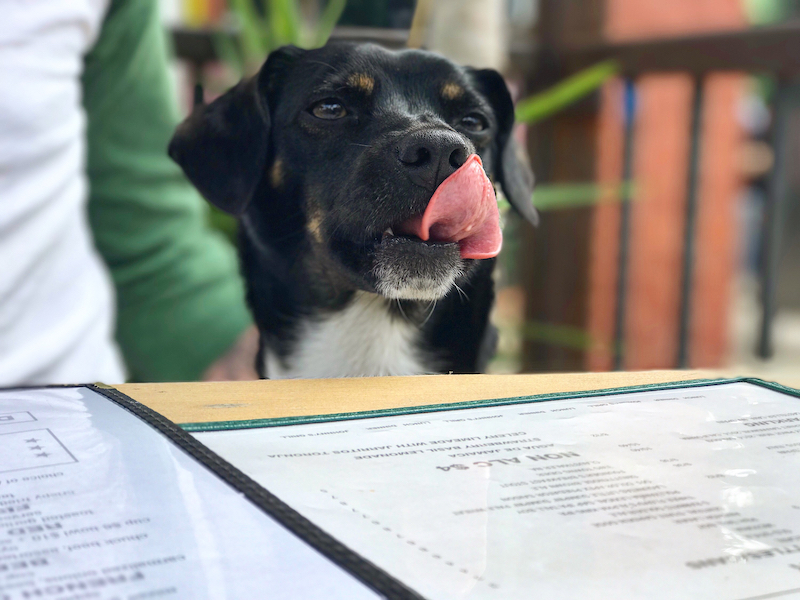
Dog lovers treat their pups like family, but do they also feed them like their human family? We asked over 1,000 dog parents about what they feed their furry family members.
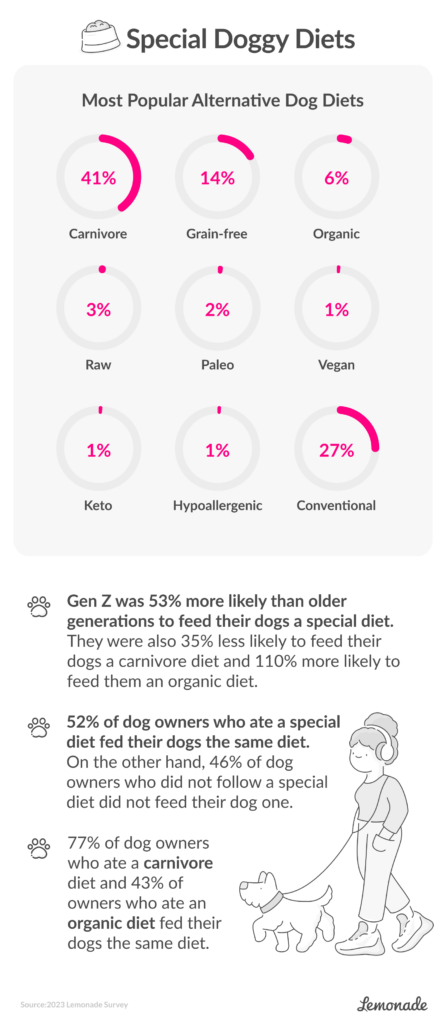
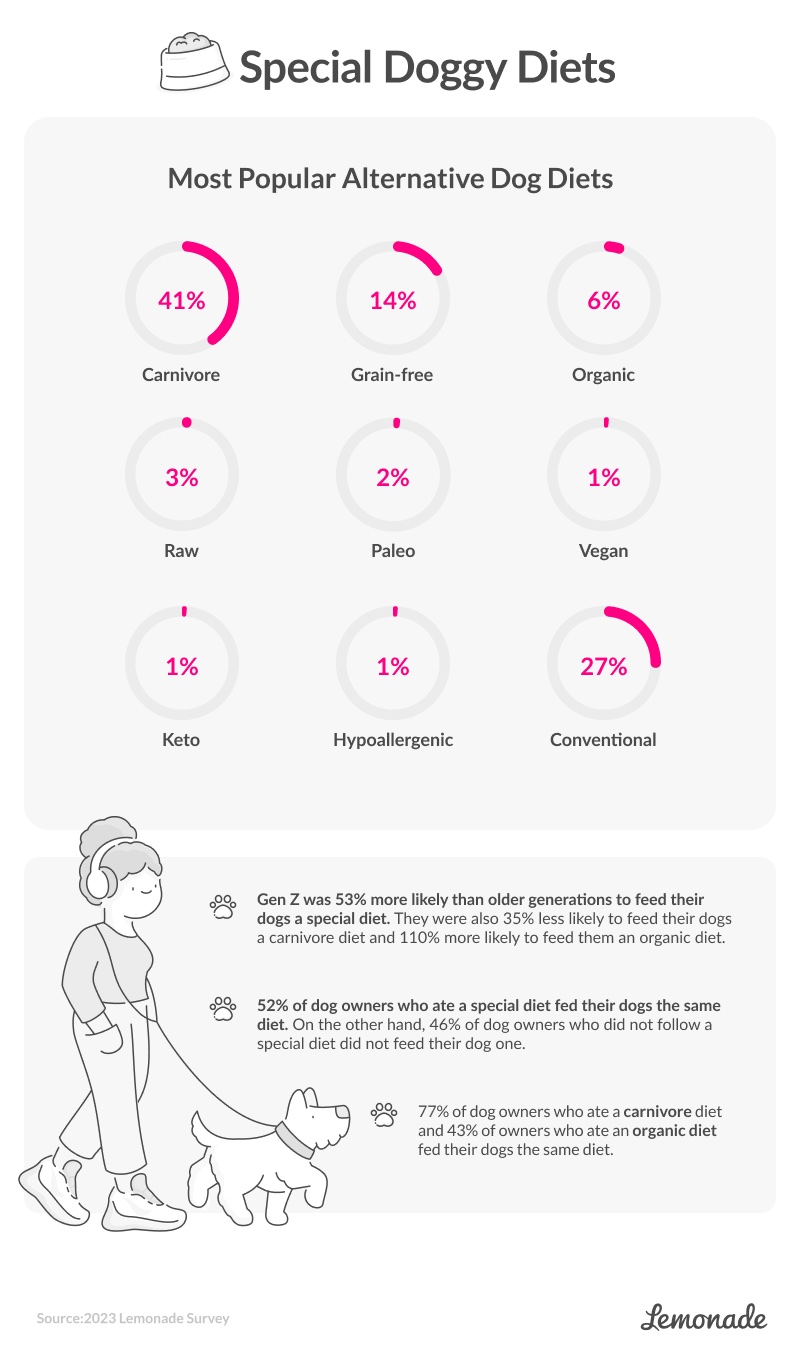
According to Dr. Liff, a healthy dog diet includes a nutritious balance of components like:
- Protein
- Fat
- Carbohydrates
- Essential vitamins and minerals
Dr. Liff recommends choosing dog foods from companies whose products are backed by scientific research and labeled with the official Association of American Feed Control Officials (AAFCO) seal. It’s also important to consider your dog’s breed, size, age, and any special dietary needs.
Surprisingly, only 27% of owners surveyed said they fed their pets a conventional dog food diet, generally consisting of commercially-branded wet and dry food; the majority of respondents had their pups on one of the following alternative human-grade diets:
Carnivore
What does the diet entail? Solely includes animal products (containing protein and fat); excludes some or all plant-based foods, grains, or any carbohydrates.
Other considerations: High in protein and fat, may need supplementation for balanced nutrition.
Grain-free
What does the diet entail? Eliminates all grains, such as wheat, corn, rice, oats, and barley.
Other considerations: Can lead to a deficiency in certain nutrients, if not balanced properly.
Organic
What does the diet entail? Excludes foods produced with synthetic pesticides, fertilizers, and GMOs.
Other considerations: Typically more expensive than non-organic foods.
Vegan
What does the diet entail? Includes plant-based foods; excludes all animal products and by-products.
Other considerations: Requires careful planning to ensure sufficient nutrients – would need to supplement with massive amounts of additives to balance a vegan diet.
Paleo
What does the diet entail? Emphasizes whole, unprocessed foods and eating habits of prehistoric humans.
Other considerations: May be difficult to implement due to the specific foods required.
Keto
What does the diet entail? Focuses on high-fat, moderate protein, and low-carb food intake.
Other considerations: Can impact dog digestion, energy levels, and weight, among other side effects.
Raw
What does the diet entail? Includes uncooked and unprocessed foods, mostly fruits, vegetables, and nuts.
Other considerations: Increased risk of foodborne illnesses.
Hypoallergenic
What does the diet entail? Eliminates foods known to cause sensitivities or allergic reactions.
Other considerations: Suited for dogs with a vet-diagnosed allergy. Requires veterinary guidance.
The carnivore diet was the most popular diet owners fed their dogs (41%), followed by grain-free (14%) and organic (6%) diets.
Dogs truly are a human’s best friend, and many owners feed their dogs the same diet that they eat. 77% of dog owners who ate a carnivore diet, and 43% of owners who ate an organic diet, reported feeding their dogs the same diet as themselves.
But can dogs thrive on a human-grade diet?
While some human foods are safe for your pup, Dr. Liff urges caution about feeding them based on your own diet or trendy fads. For example, the raw diet comes with a higher risk of bacterial contamination problems, and its nutritiousness for dogs isn’t backed by research. Dr. Liff also shared that dogs on a vegan or vegetarian diet could struggle to get the required nutrients they need to thrive.
Go-to sources

It is clear that dog owners prefer to feed their furry friends food outside of a conventional diet. But what sources do they rely on in order to make an informed choice? Let’s see where dog owners conduct their research.
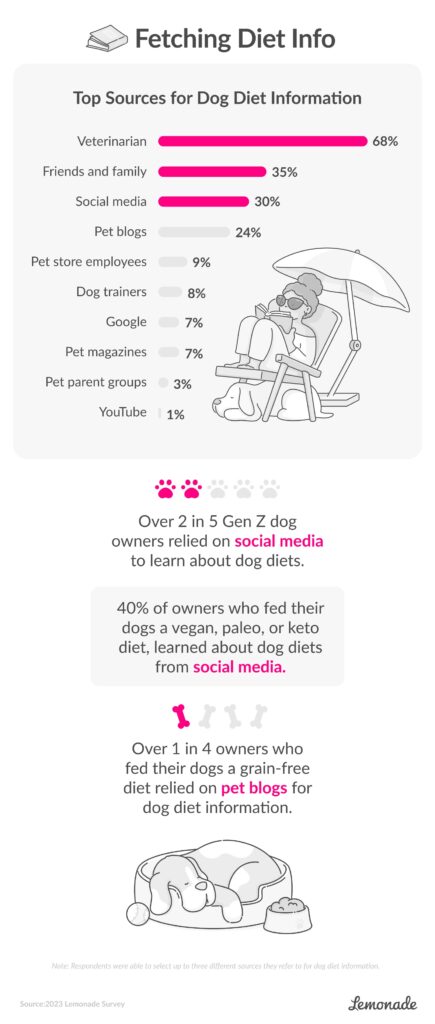
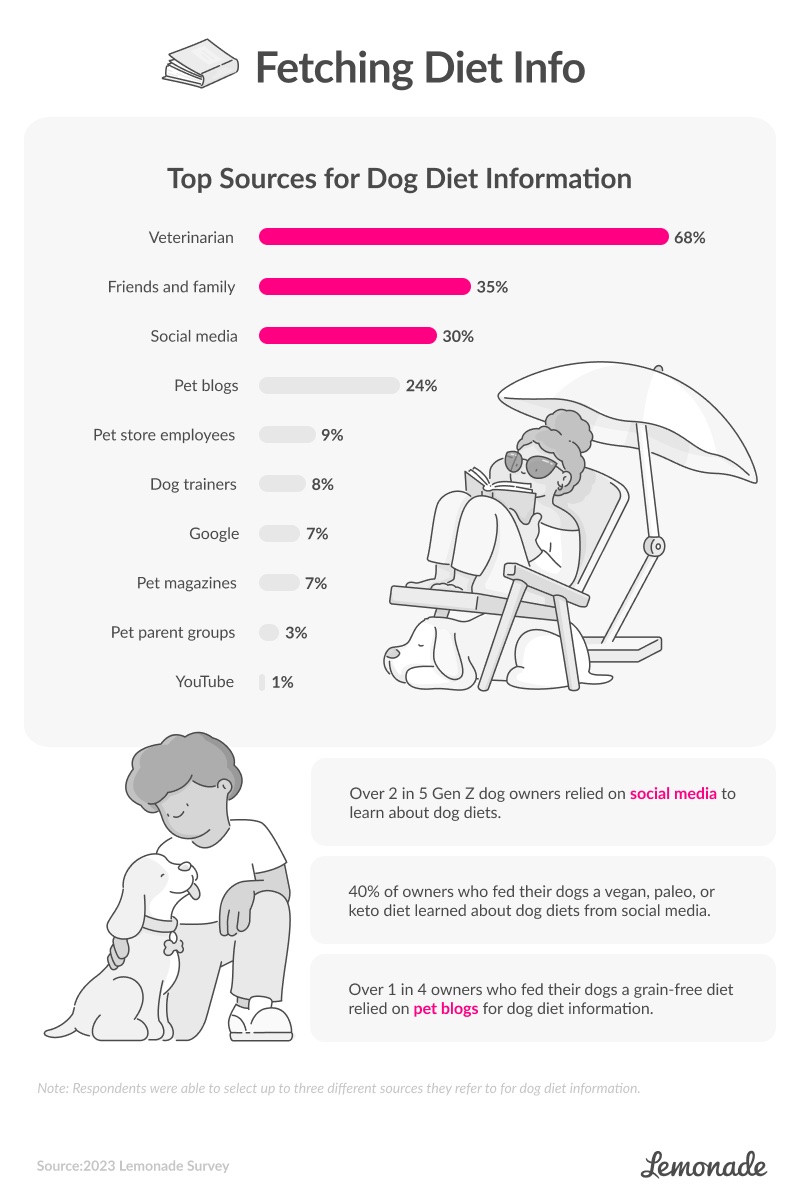
When researching their dog’s diet, 68% of owners responded that they had consulted with their veterinarian, and 35% spoke with friends and family. Gen Z dog parents, and dog owners (of all ages) who fed their dogs either a vegan, paleo, or keto diet, were more likely to turn to social media for dog nutrition information.
While bite-sized information from blogs and media is easy to find, owners should make sure the information is backed by veterinary science.
Preparing portions

Filling up those furry bellies takes more than research; it also takes money, time, and meal prep. Let’s see what dog owners are spending on these bone-a-fide meals.

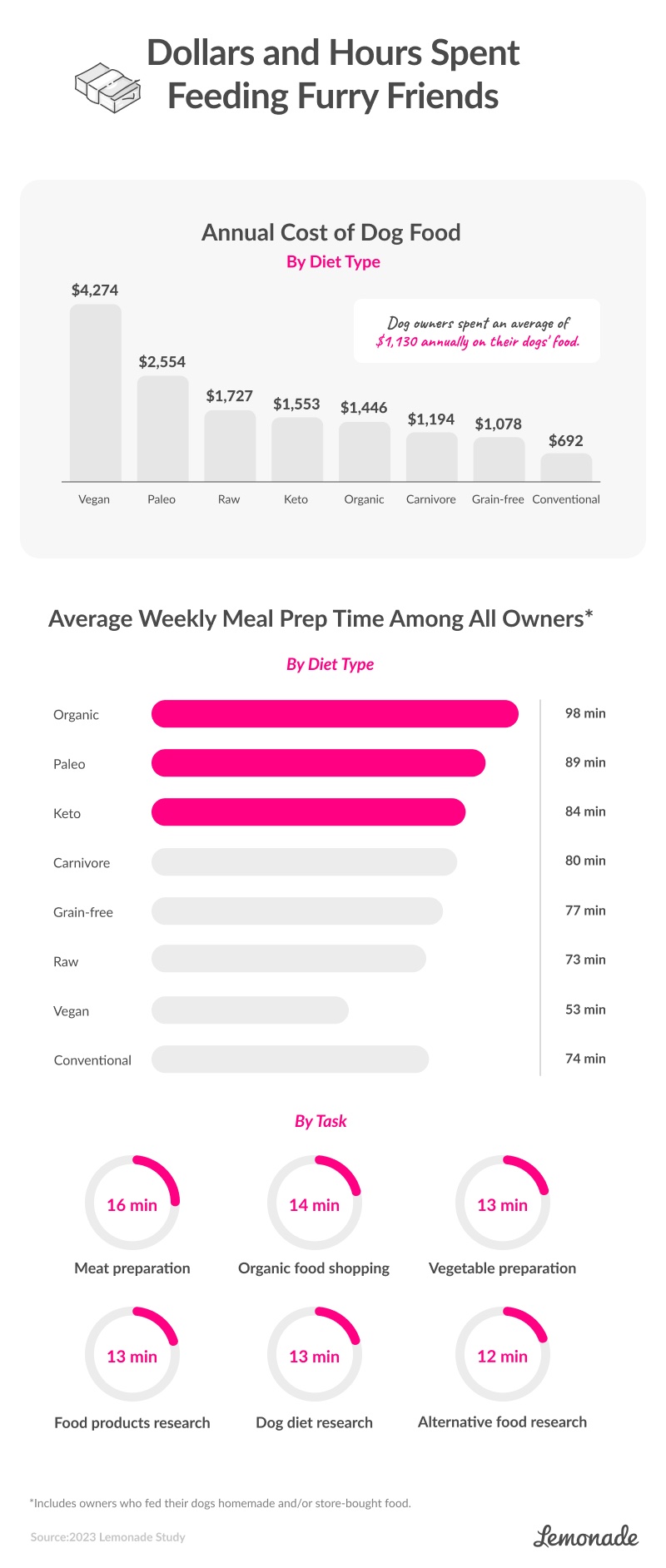
Overall, owners spent an average of $1,130 on dog food annually, but costs varied widely depending on diet.
Particularly, owners who feed their dogs a…
- Vegan diet spent an average of $4,274 annually, over 6 times more than those feeding their dogs a conventional diet
- Paleo diet spent an average of $2,554 annually
- Keto diet spent an average of $1,553 annually
As for specific meal prep tasks, owners spent the most time preparing meat, with canines left licking their chops (aka waiting) for 16 long minutes each week.
The organic diet was the most time-intensive doggy meal plan overall, requiring owners to spend an average of 98 minutes weekly across tasks related to research, shopping, and preparation.
Paws-itive pup food

Owners often turn to the internet to fetch information on dog diets. We analyzed Google Trends search data to determine which states and cities have the most research-savvy dog owners and the foods they’re interested in sharing with their furry friends.

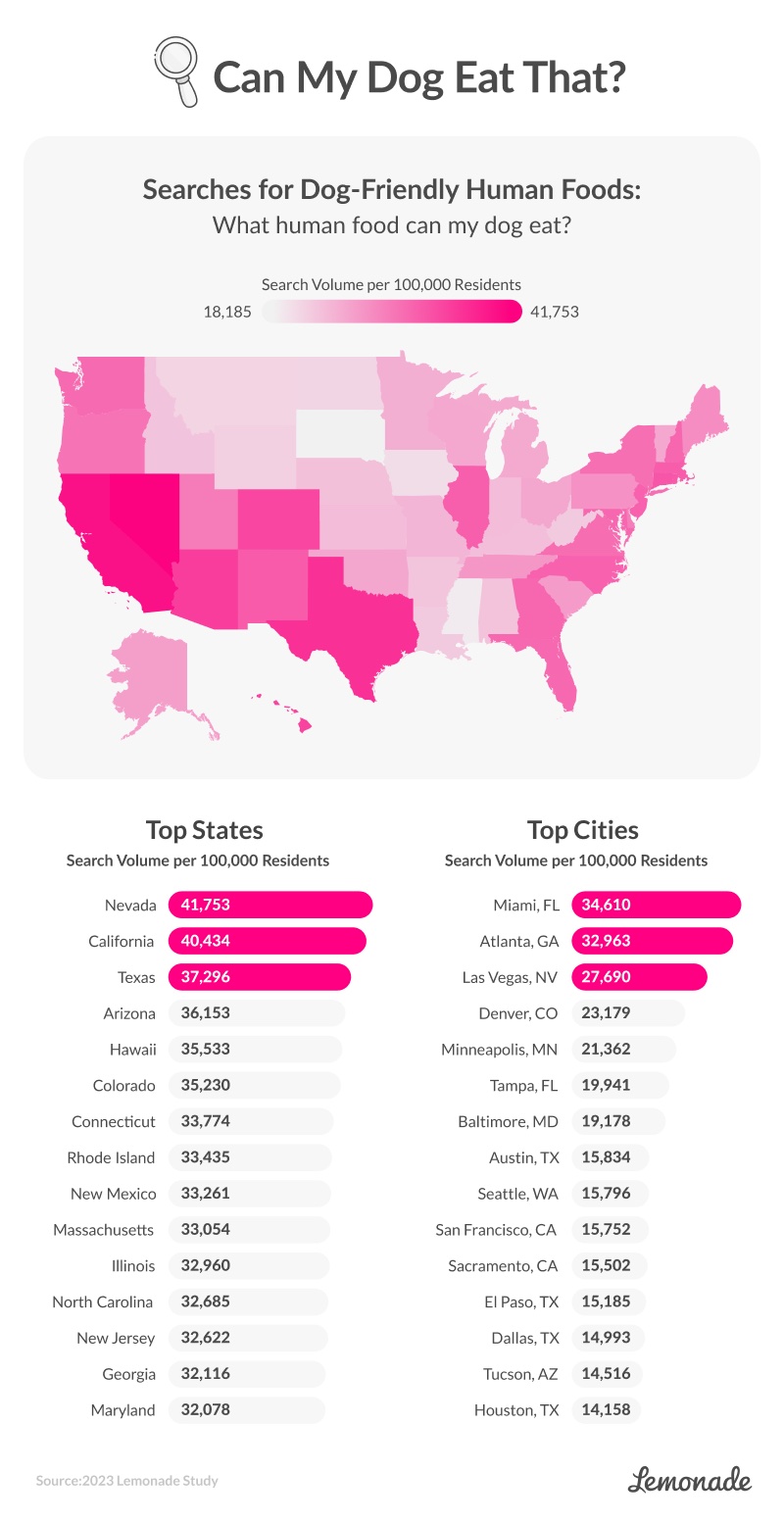
Dog owners in Nevada, California, and Texas led the pack with the most searches for dog-friendly human foods. These were the top three states searching for “what human food can my dog eat” per 100,000 residents.
Nevada and Texas also rank among the top 10 states with the most devoted dog owners (which helps explain their commitment to learning about pet nutrition).
As for cities, Miami, Atlanta, and Las Vegas searched the most for “what human food can my dog eat” per capita. Interestingly, other cities were more likely to search what human foods their dogs shouldn’t eat.
Searches for toxic foods to keep out of their pets’ reach were highest in the following cities:
- Portland, OR
- San Francisco, CA
- Tucson, AZ
- Mesa, AZ
- Sacramento, CA
Let’s take a closer look at the human-grade foods dog owners were specifically curious about.

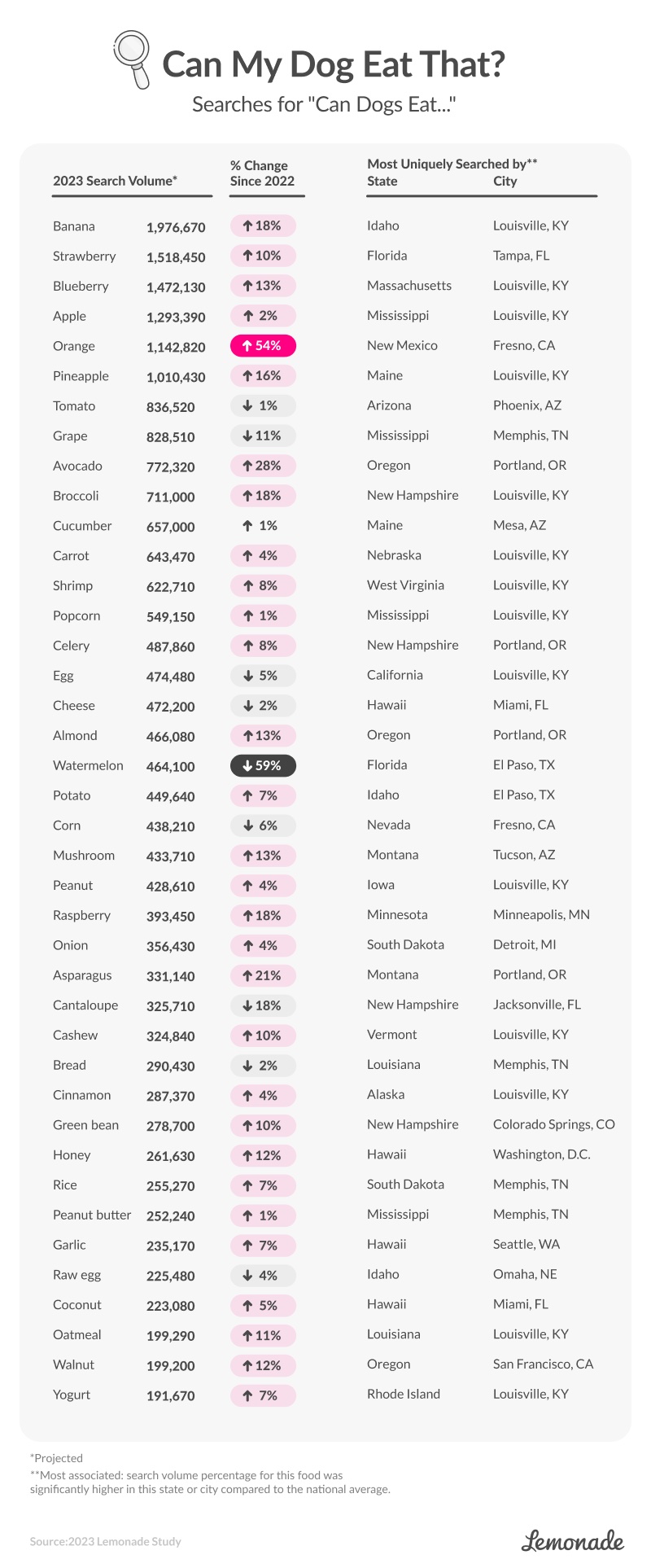
Our data revealed that people were most curious about whether their dogs could eat certain fruits. Based on the search volume in 2022 and the first half of 2023, we estimate that dog owners will turn to Google over 1.9 million times to ask if bananas are a safe snack for their dogs (they are!) in 2023 alone.
Pet parents will also check with Google if their furry companion can eat strawberries, blueberries, apples, oranges, and pineapples over 1 million times each.
Luckily, Dr. Liff confirmed that it’s generally OK for dogs to eat some “people food,” including fresh fruit like blueberries. They just need to be given in moderation (like as a snack), and to avoid grapes, pits, seeds, and hard cores, due to toxicity. Dr. Liff also explained it’s safe for dogs to snack on lean meat and fish cooked plainly or on vegetables.
But of course, some human-grade food is toxic to dogs and can cause serious, life-threatening emergencies. Even minor amounts of toxic food can lead to major tummy troubles or worse—and no one wants to deal with the aftermath of bad doggy digestion.
The following items are considered toxic foods for dogs:
- Chocolate
- Alcohol
- Fruit seeds
- Avocado
- Xylitol
- Coffee, tea, and other substances that contain caffeine
- Garlic
- Onions
- Grapes and raisins
- Macadamia nuts
- Yeast dough
- Moldy walnuts
Some human foods are also known as major choking hazards, and others can lead to intestinal blockage. Dog owners should never offer their pups things like cooked bones or corn on the cob, for example (as tempting as it is to share some scraps at a summer BBQ). These items aren’t necessarily toxic, but they can create a life threatening emergency, and could even require an expensive surgery.
Only the best for your best friend
In-between belly rubs and games of fetch, dog owners are willing to spend a lot of time and money to make sure their four-pawed pals are eating a healthy diet. From eagerly searching for dog-friendly human foods, creating special diet plans, or carefully selecting organic produce and preparing fresh foods, dog owners are committed to providing their four-legged best friends with high-quality canine cuisine.
Despite all this love and care, we know that dogs can get into things from time to time and eat something they shouldn’t. It’s helpful to learn more about how pet insurance works and make a plan before facing an emergency. Having dog insurance already in place gives pet parents some peace of mind should their dog ingest something they shouldn’t have. Seeking emergency care is pricey, but just how much does a vet visit cost?
An ER exam, diagnostic testing, and overnight hospitalizations can easily add up to over $5,000.
Getting pet insurance for your pup can help take a bite out of vet bills, but you might be wondering—how much does pet insurance cost? Several factors can impact your premium—including the age of your pooch, where you live, and the specific coverages you include on your policy.
Whatever diet you choose for your paw-some pooch, make sure your nutrition information comes from reputable sources. With veterinary recommendations, a little time and money, and a lot of love, your best friend can eat a healthy and delicious diet that will keep their tail wagging for years to come.
Methodology
For this campaign, we analyzed Google Trends search volume for the most common searches mentioning “can my dogs eat.” Data was collected from 2022 and January through April 2023, with 2023 values scaled to represent a full year. We also surveyed 1,007 dog owners about their dogs’ diets. If dog owners had more than one dog, they were asked to answer all questions based on one of their dogs to maintain consistency. Dog nutrition advice was provided by Lemonade’s vet health expert, Dr. Stephanie Liff.
About Lemonade
Lemonade is the easiest way to find affordable and transparent pet insurance coverage. We charge a flat fee, pay claims fast, and give back what’s left to causes you care about—like animal rights!
Fair Use Statement
Did this article make you say bow-wow? Feel free to share this article with anyone you’d like for noncommercial purposes only; you must provide a link back to this page so readers can access all the doggy diet details.
A few quick words, because we <3 our lawyers: This post is general in nature, and any statement in it doesn’t alter the terms, conditions, exclusions, or limitations of policies issued by Lemonade, which differ according to your state of residence. You’re encouraged to discuss your specific circumstances with your own professional advisors. The purpose of this post is merely to provide you with info and insights you can use to make such discussions more productive! Naturally, all comments by, or references to, third parties represent their own views, and Lemonade assumes no responsibility for them. Coverage and discounts may not be available in all states.




